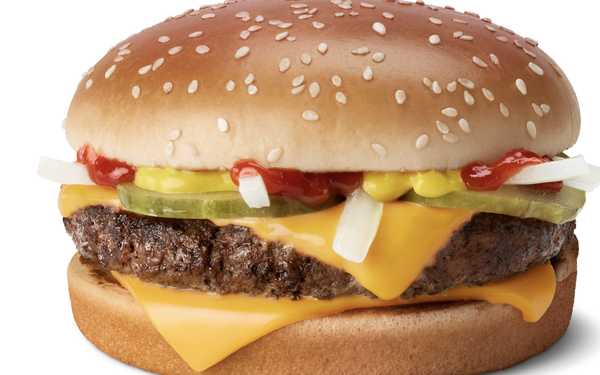
Needless to say,
McDonald’s hasn’t had the best week. The still-breaking news continues into the latter half of the week on the discovery of E.coli potentially present in onions on what is believed to be
the chain’s Quarter Pounder, causing one death and more than 50 patrons to become ill across the West and Midwest U.S.
Saying the chain took swift action would be an understatement.
McDonald’s CEO Joe Erlinger directly addressed the public yesterday in a video on YouTube, where he reassured customers of the
importance of food safety to the chain, working with the Centers for Disease Control, United States Department of Agriculture
and Food and Drug Administration, making “preemptive strikes” by removing onions from the supplier in question, and putting a temporary stop on serving the Quarter Pounder in affected
locations. He has also been making the rounds on major broadcast media such as “The Today Show.”
The chain’s speedy response appears to be effective in helping to quell too
much public pessimism thus far. According to search intelligence company Captify, negative searches accounted for 8% of all searches related to McDonald’s yesterday, Oct. 23. Comparatively, 2%
of searches for McDonald’s in the month of October were negative prior to yesterday, after the news of the outbreak broke in the media.
“Food safety issues are a key
environmental, social, and governance risk for restaurateurs, given that their brand strength rests heavily on consumer trust. That said, considering larger brands' sprawling store footprints and
diverse supplier bases, small outbreaks happen every couple of years,” explained Morningstar Analyst Sean Dunlop in an email to QSR Insider. “Consumers tend to be most forgiving
when management is transparent, takes quick remedial action, can definitively source the issue, and avoids repeating mistakes. Under such circumstances, food safety scares rarely have a long-term
impact on brand health.”
Dunlop cites recent cases when other QSRs were negatively impacted by food safety and supply chain issues such as Chipotle and KFC China, and notes, “This
[McDonald’s] case looks distinctly different to us. Unlike Chipotle's scares, which proved material for shareholders (seeing comparable sales decline by a striking 30% during the first quarter
of 2016), it appears that McDonald's has been able to identify the source of the issues swiftly and react quickly to pull the affected products. … This situation looks much like how Wendy's
deftly managed its E.coli outbreak in 2022, which appeared to drive a small decline in in-period comparable store sales and minimal lasting impact.”
But as news of the first lawsuit
filed against the chain only just appeared online this morning via various media outlets, McDonald’s efforts to nip the bad publicity in the bud may still have a lingering negative affect on
consumer attitudes. But that too may be short-lived.
“I expect negative sentiment to continue to rise for at least a few more days, as bad news travels faster than good
news,” Isaac Gerber, Captify global director data science and insights, told QSR Insider. “We typically don’t see a peak in negative sentiment until two or three days after
the event occurred or was discovered. To that vein, I doubt the [CEO’s] video will have a large impact on the customers that need to hear the news the most, so this will continue to impact
McDonald’s over the next few days.”